Archive
Lisp and functional languages discourage free riders
While many developers have a favorite programming language, there are a few who believe they have found the One True Language and refuse to even consider coding in another language.
Why is the One True Language invariably a dialect of Lisp or a functional language?
I think the reason is the same as why strict churches are strong, both these language families make life difficult for free riders, i.e., the casual programmer.
Superficially Lisp-like languages look unwelcoming because of all those brackets and the tiresome reverse polish notation, but once past these surface speed bumps life is not a bed of roses, there are mind bending language challenges to master at every abstraction level; developers get sucked into the community working on mastering each level (this suggests an alternative explanation that coding in Lisp is a way of continuing to play Dungeons & Dragons while appearing to work).
True functional languages don’t have global variables and certainly don’t let you create stateful information. The self-flagulation no global variable languages have a limited clientèle; its the writing of programs that don’t make use of side-effects (e.g., iteration via recursion, not explicit loops) that marks out the true community members; a short conversation with a developer is enough to tell whether they are one-of-us who joyfully tells the world of their latest assignment-free solution to an apparently intractable problem (intractable in the sense of appearing to require the use of assignment statements). There are always umpteen different ways of writing something in functional languages, providing plenty of scope for sects to splinter off by requiring disciples to follow a particular approved style.
Why have Lisp and functional programming continued to survive for so long? Some interesting research on communal societies has found a correlation between the number of costly requirements entailed by community membership and community longevity, the greater the number of costly requirements the longer a community survives. Having sunk so much time and effort into the costly signaling required for community membership, people are loath to leave it all behind.
Actively maintained production compilers for middle-age languages
The owners of the Borland C++ compiler have stopped maintaining it. So we are now down to, by my counting, three four different production quality C++ compilers still being actively maintained (Visual C++ {the command line c1.exe, not the interactive IDE compiler}, GCC, LLVM and EDG); lots of companies repackage EDG and don’t talk about it.
How many production compilers for other middle-age languages are still being actively maintained?
Ada I think is now down to one (GNAT; I’m not sure of the status of what was the Intermetrics compiler).
Cobol has two+ (I’m not sure how many internal compilers IBM has, some of which are really Microfocus) that I know of (Microfocus and Fujitsu {was ACUCobol}).
Fortran probably needs more than one hand to count its compilers. Nothing like having large engineering applications using the languages features supported by your compiler to keep the maintenance fees rolling in.
C still has lots of compilers (a C validation suite vendor told me many years ago that they had over 150 customers). Embedded processors can be a very tough target for the general purpose algorithms used in GCC and LLVM, so vendors with hand crafted compilers can still eek out a living.
Perl has one (which I find surprising).
R has one, but like Cobol it is not a fashionable language in compiler writing circles. Over the last couple of years there have been a few ‘play’ implementations and rumors of people creating a new production quality implementation.
Lisp has one or millions, depending on how you view dialects or there could be a million people with a different view on the identity of the 1.
Snobol-4 still has one (yes, I am a fan of this language).
There are lots of languages which have not yet reached middle-age, so its too soon to start counting how many actively supported compilers they still have in production use.
February 2012 news in the programming language standard’s world
Yesterday I was at the British Standards Institute for a meeting of the programming languages committee. Some highlights and commentary:
- The first Technical Corrigendum (bug fixes, 47 of them) for Fortran 2008 was approved.
- The Lisp Standard working group was shutdown, through long standing lack of people interested in taking part; this happened at the last SC22 meeting, the UK does not have such sole authority.
- WG14 (C Standard) has requested permission to start a new work item to create a new annex to the standard containing a Secure Coding Standard. Isn’t this the area of expertise of WG23 (Language vulnerabilities)? Well, yes; but when the US Department of Homeland Security is throwing money at cyber security increasing the number of standards’ groups working on the topic creates more billable hours for consultants.
- WG21 (C++ Standard) had 73 people at their five day meeting last week (ok, it was in Hawaii). Having just published a 1,300+ page Standard which no compiler yet comes close to implementing they are going full steam ahead creating new features for a revised standard they aim to publish in 2017. Does the “Hear about the upcoming features in C++” blogging/speaker circuit/consulting gravy train have that much life left in it? We will see.
The BSI building has new lifts (elevators in the US). To recap, lifts used to work by pressing a button to indicate a desire to change floors, a lift would arrive, once inside one or more people needed press buttons specifying destination floor(s). Now the destination floor has to be specified in advance, a lift arrives and by the time you have figured out there are no buttons to press on the inside of the lift the doors open at the desired floor. What programming language most closely mimics this new behavior?
Mimicking most languages of the last twenty years the ground floor is zero (I could not find any way to enter a G). This rules out a few languages, such as Fortran and R.
A lift might be thought of as a function that can be called to change floors. The floor has to be specified in advance and cannot be changed once in the lift, partial specialization of functions and also the lambda calculus springs to mind.
In a language I just invented:
// The lift specified a maximum of 8 people lift = function(p_1, p_2="", p_3="", p_4="", p_5="", p_6="", p_7="", p_8="") {...} // Meeting was on the fifth floor first_passenger_5th_floor = function lift(5); second_passenger_4th_floor = function first_passenger_fifth_floor(4); |
the body of the function second_passenger_4th_floor is a copy of the body of lift with all the instances of p_1 and p_2 replaced by the 5 and 4 respectively.
Few languages have this kind of functionality. The one that most obviously springs to mind is Lisp (partial specialization of function templates in C++ does not count because they are templates that are still in need of an instantiation). So the ghost of the Lisp working group lives on at BSI in their lifts.
Language usage in Google’s ngram viewer
I thought I would join the fun that people are having with Google’s new ngram viewer. The raw data (only a subset for bigrams and longer ngrams) was also enticing, but at 35+ gigabytes for the compressed 1/2/3-grams of English-all I decided to forgo the longer n-grams.
We all know that in the dim and distant past most programmers wrote in machine code, but it was not until 1980 that “source code” appeared more frequently in books that “machine code”.
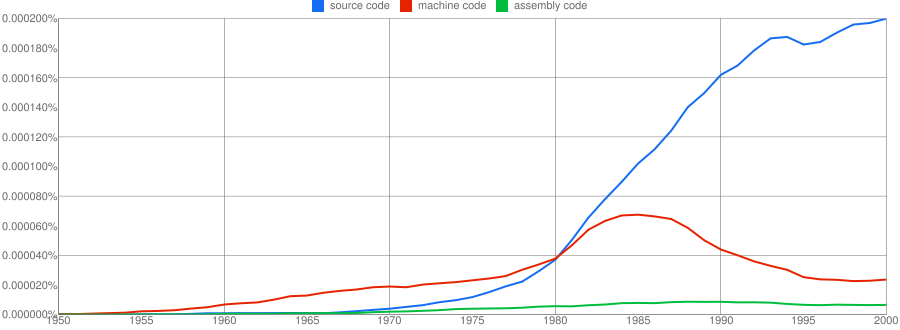
Computer language popularity is a perennial question. Fortran and Cobol address very different markets and I would have expected their usage to follow similar patterns, with “COBOL” having the obvious usage pattern for them both to follow. Instead, both “FORTRAN” and “Fortran” peaked within 10 years, with one staying there for another 20 years before declining and the other still going strong in 2000 (and still ahead of “PHP” and “Python” in 2000; neither shown to keep the clutter down). I am surprised to see “Prolog” usage being so much greater than “Lisp” and I would have expected “Lisp” to have a stronger presence in the 1970s.
I think the C++ crowd will be surprised to see that in 2000 usage was not much greater than what “FORTRAN” had enjoyed for 20 years.
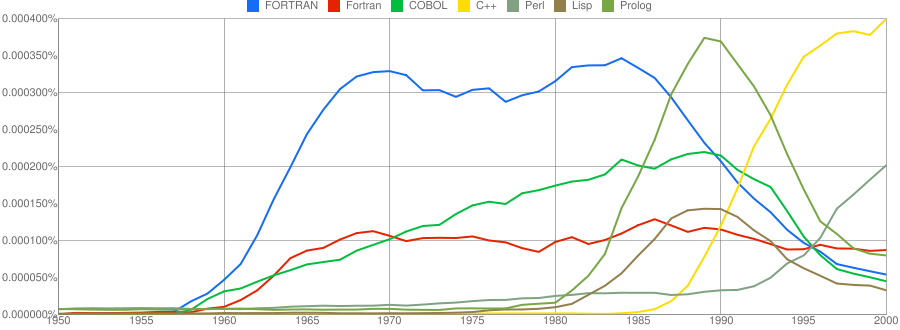
“C”, as in language, usage is obviously different to reliably measure. I have tried the obvious bigrams. Looking at some of the book matches for the phrase “in C” shows that the OCR process has sometimes inserted spaces that probably did not exist in the original, the effect being to split words and create incorrect bigrams. The phrase “in C” would also appear in books on music.
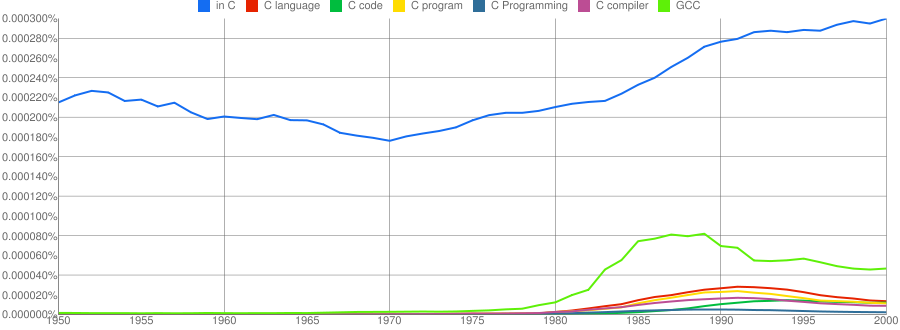
I have put the three words “Java”/”SQL”/”BASIC” in a separate plot because their usage swamps that of the other languages. Java obviously has multiple non-computer related uses and subtracting the estimated background usage suggests a language usage similar to that of “SQL”. There is too much noise for the usage of “Basic” to tell us much.
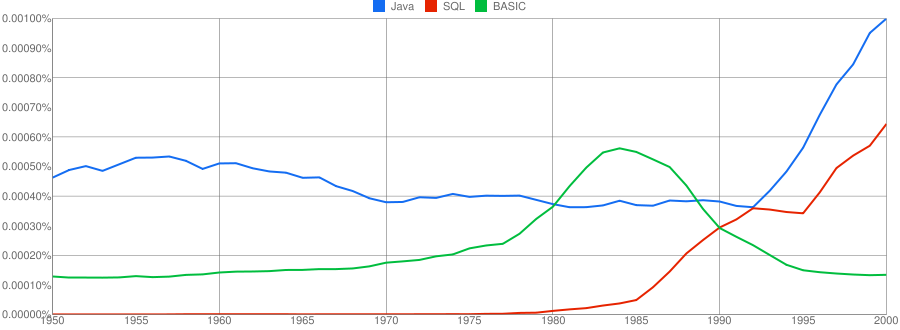
One way of comparing C/C++ language usage is to look source code usage where they are likely to differ. I/O, in the form of printf/scanf and stdio/iostream, is one obvious choice and while the expected C usage starts to declines in the 1990s the C++ usage just shows a stead growth (perhaps the <</>> usage, which does not appear in the Google viewer, has a dramatic growth during this time period).
Surprisingly #define also follows a similar pattern of decline. Even allowing for the rabid anti-macro rhetoric of the C++ in-crowd I would not have expected such a rapid decline. Perhaps this is some artifact of the book selection process used by Google; but then "namespace" shows a healthy growth around this time period.
The growth of "inline" over such a long period of time is a mystery. Perhaps some of this usage does not relate to a keyword appearing within source code examples but to text along the lines of "put this inline to make it faster".
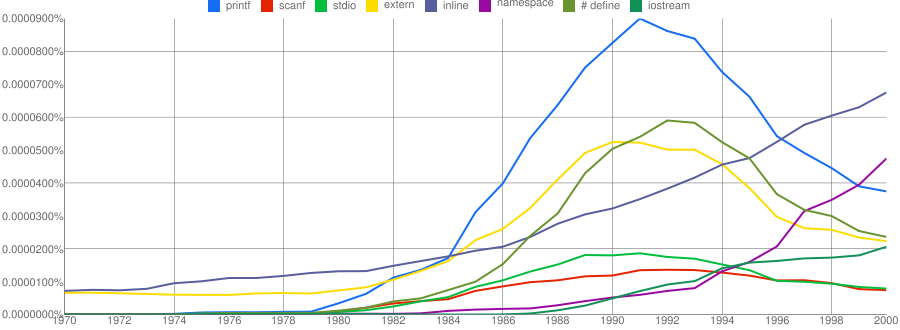
What usage should we expect for the last decade? A greater usage of "PHP" and "Python" is an obvious call to make, along with the continuing growth of SQL, I think "UML" will also feature prominently. Will "C++" show a decline in favor or "Java" and what about "C#"? We will have to wait and see.
Recent Comments